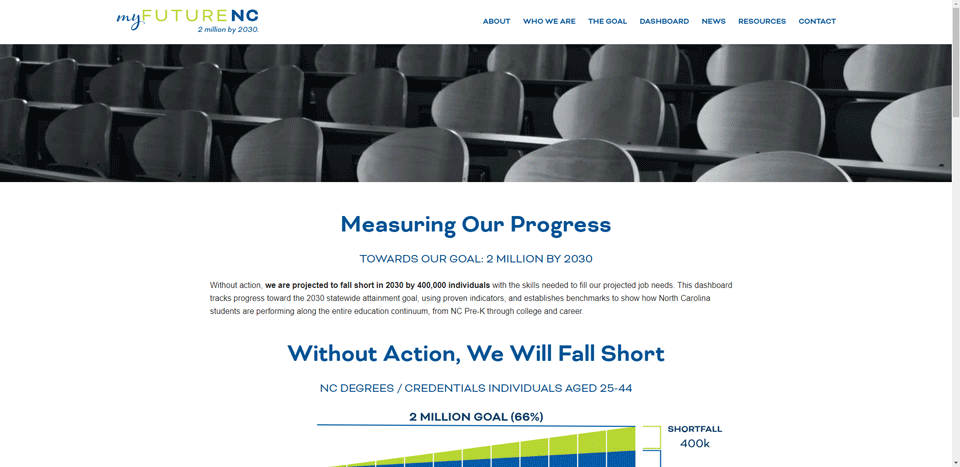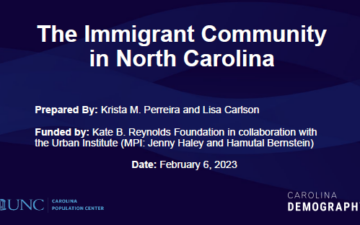Tracking our progress: We built a new statewide education dashboard

We partnered with myFutureNC to launch a statewide attainment dashboard to serve as a shared, nonpartisan source of information about the state of education in North Carolina. The dashboard tracks proven indicators along the education continuum, capturing key transition points for students from NC Pre-K enrollment through degree or credential completion and into the labor market.
On the dashboard, you’ll find a simple, visual way to learn more about individual indicators, including how we calculated the data and why each indicator is important to the state’s overall attainment goal of having 2 million North Carolina 25-44-year-olds with a postsecondary degree or credential by 2030.

The dashboard extends the work we’ve done over the past four years within North Carolina to help state and local leaders understand the educational landscape and potential barriers to attainment. In earlier work with the North Carolina Education Cabinet and then the North Carolina Community College System, we developed data-driven guidance that helped leaders better understand the current educational landscape and future opportunities.
Last March, in conjunction with the John M. Belk Endowment, we released a detailed report mapping out North Carolina’s public postsecondary education pipeline and identifying the state’s biggest opportunities for improvement.
That work identified four main opportunity areas where shifting student outcomes has the potential to have large effects on overall attainment:
You can find detailed information about all four of these areas on the new attainment dashboard, plus information on 14 other indicators along the entire educational continuum. We are also in the process of releasing detailed information at the county level to inform ongoing efforts across the state. [Edit: As of August 2020, all 100 county profiles are available for download here.] The following counties are currently available:
In the coming months, we will add additional information for all 100 counties. If you would like to receive an update when that information comes out, please sign up with your county information and we’ll send you an email later this year.
The myFutureNC Commission’s Call to Action for the State of North Carolina recommended a 2030 statewide attainment goal of 2 million 25-44-year-olds (about two-thirds of the projected state population in that age range) with a high-quality postsecondary credential or degree. In addition, the Commission further recommended tracking a set of performance indicators to ensure that progress across the education continuum will help the state meet the overall attainment goal.
To determine which indicators should be tracked, the commissioners heard from leading national and in-state researchers, policymakers, and other experts on education and workforce alignment. They then worked to determine which data points to include and how to prioritize them.
Dr. Jeni Corn, myFutureNC’s Director of Strategic Initiatives and a leading researcher in education evaluation, and I began the process of pulling those data points into a table that would eventually become the dashboard. We reviewed every single potential indicator several times to ensure that each indicator had strong research supporting its relationship with future education and labor market outcome, and that the data was regularly updated and available from trusted sources.
We see the dashboard as a common source of information for the state and stakeholders across the education landscape. It can answer questions like:
We also heard from stakeholders who wanted actionable information to make decisions and take action in their own communities. We partnered with the Land of Sky Education and Workforce Collaborative to develop the first set of county attainment profiles. These profiles detail local performance across the education continuum and identify high impact strategies—specific areas of opportunity to improve future attainment—for each county.
Friends who work with data know that 95% of the job is cleaning data, and this project was no exception.
It’s now clean and ready for you to use.
On the website, you’ll find all of the dashboard data in a csv for you to explore, along with detailed data guidance.
North Carolina’s statewide goal is unique in that the focus is on all aspects of the educational continuum, from birth to career. This means we needed a lot of data points. How many?
And that’s just the final dashboard data. We also evaluated every potential source of data to measure the indicators presented on the dashboard so we could understand pros/cons about certain decisions.
We are excited to present this data in the dashboard and county profiles, but even more excited about the potential additional research questions, news reports, and other projects that might be pursued with easy access to the data.
We are sharing this data freely, we only ask (to crib from IPUMS):
And, as always, please let us know if you have any questions.
We have been generously supported by the John M. Belk Endowment to continue our research into North Carolina’s education continuum and work to translate these results at the local level.
The Endowment is also a major supporter of myFutureNC. The effort to localize and communicate our initial findings from last year’s report had strong alignment with myFutureNC’s need to measure progress at the state and local level.
Over the next few months, we’ll be releasing detailed county attainment profiles for all 100 counties and visiting communities around the state to share information and collect feedback. We’ll be working with myFutureNC and local leaders to localize the statewide attainment goal of #2millionby2030.
And, for data nerds: we’ll be releasing the cleaned up county data for you to use.
Need help understanding population change and its impacts on your community or business? Carolina Demography offers demographic research tailored to your needs.
Contact us today for a free initial consultation.
Contact UsCategories: Education, NC in Focus

The Center for Women’s Health Research (CWHR) at the University of North Carolina School of Medicine released the 12th edition of our North Carolina Women’s Health Report Card on May 9, 2022. This document is a progress report on the…

Dr. Krista Perreira is a health economist who studies disparities in health, education, and economic well-being. In collaboration with the Urban Institute, she recently co-led a study funded by the Kate B. Reynolds Foundation to study barriers to access to…

Our material helped the NC Local News Lab Fund better understand and then prioritize their funding to better serve existing and future grant recipients in North Carolina. The North Carolina Local News Lab Fund was established in 2017 to strengthen…
Your support is critical to our mission of measuring, understanding, and predicting population change and its impact. Donate to Carolina Demography today.